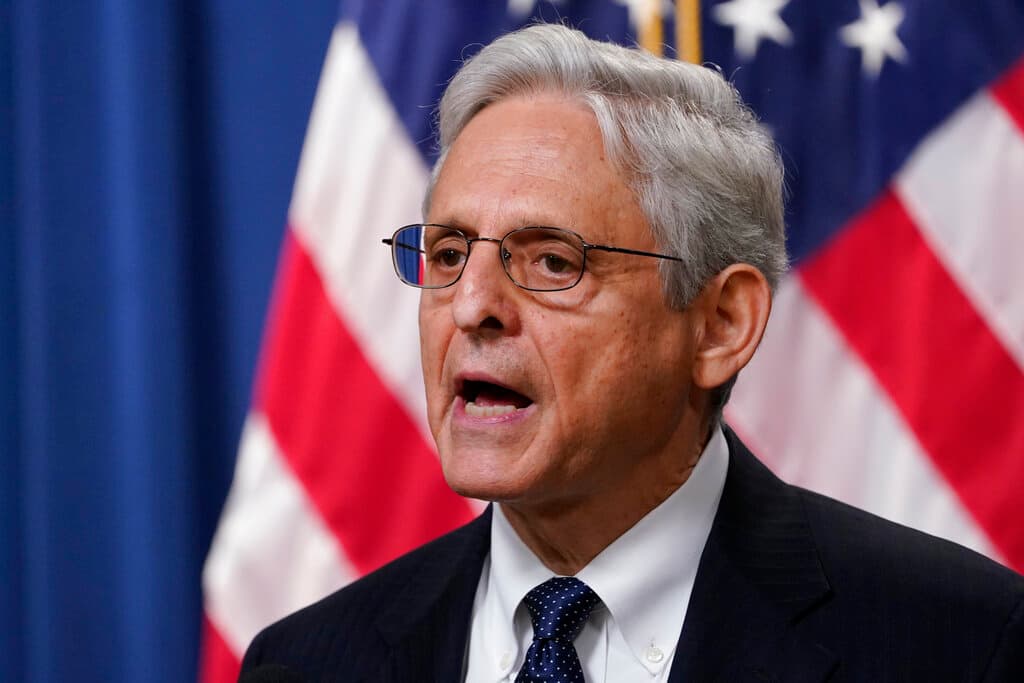Trump’s Tease and Garland’s Decision
The former president appears to have made up his mind. Now it’s the attorney general’s turn.

President Trump’s election eve announcement — at a rally for the Senate candidate of Ohio, J.D. Vance — that he will declare for the presidency on November 15 came after reports that November 14 would be the day. There was even speculation that he would cross that Rubicon with Mr. Vance by his side.
Even though he appears on no ballot, Mr. Trump’s electoral teasing has once again put him at center stage. At Dayton, he said, “I’m going to be making a very big announcement on Tuesday, November 15, at Mar-a-Lago in Palm Beach, Florida,” Such an announcement would mark his third run for the White House.
In declining to announce then and there, Mr. Trump noted that “we want nothing to distract from the importance of tomorrow.” This comes on the heels of an appearance at an Iowa rally on Thursday, where he said he would “very, very probably do it again, OK?”
Mr. Trump also told the Hawkeye State crowd to “get ready. That’s all I’m telling you. Very soon. Get ready. Get ready.” Months ago, he told New York magazine’s Olivia Nuzzi that “in my own mind, I’ve already made that decision, so nothing factors in anymore.”
Mr. Trump’s fate, though, will rest with minds other than his own. Chief among those is Attorney General Garland, who will decide whether to criminally charge Mr. Trump for spiriting away documents from the White House to his Florida compound, and for his conduct on January 6, 2021.
One signal on that front was the Department of Justice granting general immunity — the most comprehensive kind — to a former aide to Mr. Trump, Kash Patel. The Wall Street Journal reports the offer was not exclusive, as “other Trump associates involved in the Mar-a-Lago documents matter also have been offered some form of immunity.”
Prosecutors’ ears likely perked up when Mr. Patel proclaimed that he “was there with President Trump” when the president chose to declassify the trove of records that made their way to the Sunshine State. Mr. Patel pleaded the Fifth in front of the grand jury, triggering the DOJ to trade immunity for his testimony.
The looming indictment is already informing the post-election landscape. Anticipating both charges and a Republican victory, Senator Cruz told the Hill that if President Biden “treats the Department of Justice as partisan stormtroopers, then Congress is justified in using whatever tools Congress has to stop that abuse of power.”
Wary of the ability of Republicans to impede any prosecution of Mr. Trump — several in the GOP have threatened to hold up DOJ funding under such a scenario — the government has reportedly begun to discuss whether the appointment of a special prosecutor would be in order.
Such a course was urged by a Harvard law professor, Jack Goldsmith, in an op-ed last June, with the goal of ameliorating the conflict of interest that adheres in Mr. Garland leading the prosecution of his boss’s premier political rival. Even if a special counsel was appointed, the decision to charge will rest with Mr. Garland.
By statute, the special counsel would be insulated from presidential pressure, an appealing feature for Democrats considering the possibility that Mr. Trump himself could move back into the White House in the early days of 2025. The recent experiences of special counsels Robert Mueller and John Durham suggest, however, that their appointment is no panacea.
Black letter law mandates two conditions be met to justify the appointment of a special counsel. The first is a conflict of interest and the second is the interest of the public. The statute expects a special counsel to be a “lawyer with a reputation for integrity and impartial decision making.”
If Mr. Garland does decide to charge Mr. Trump, the next choice will be when that indictment is handed down. Internal DOJ guidelines, reaffirmed by Mr. Garland in May, note that “partisan politics must play no role in the decisions of federal investigators or prosecutors regarding any investigations or criminal charges.”
That admonition has been taken to mean that the government is discouraged from levying charges against political figures in close proximity to an election, traditionally 60 days before an election. That tradition assumes, though, that the candidate in question is on the ballot. Mr. Trump’s expected announcement catapults that hypothetical to the realm of distinct possibility.

